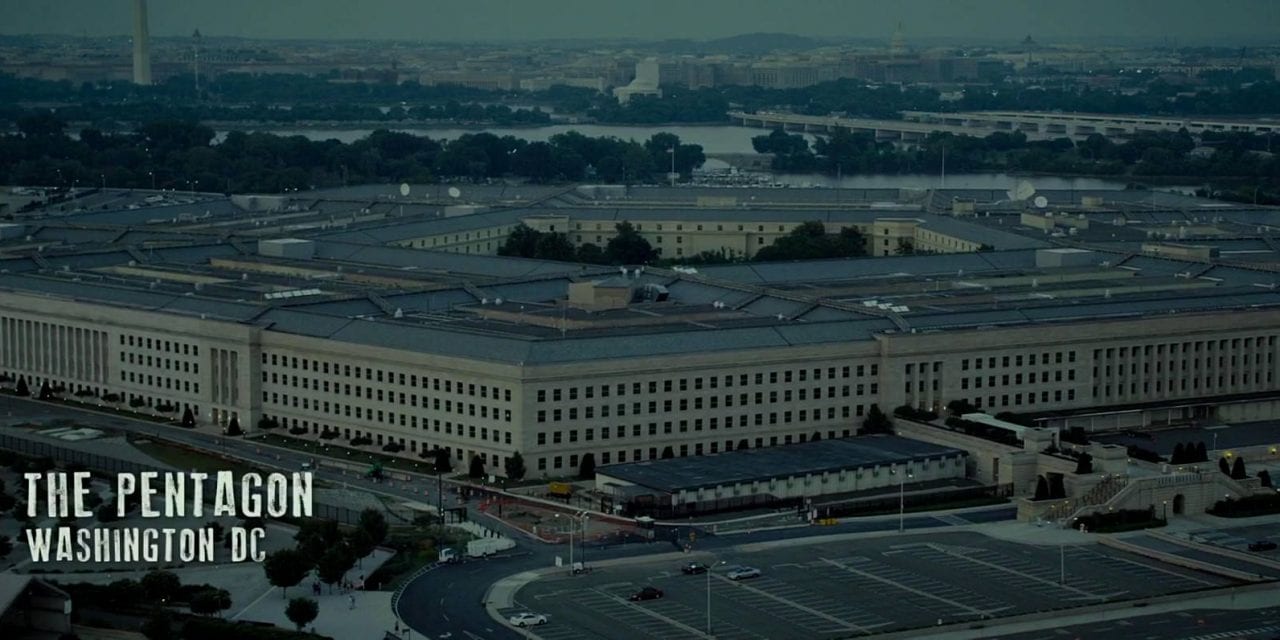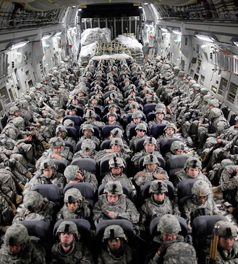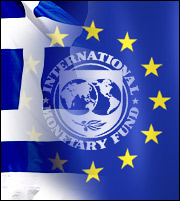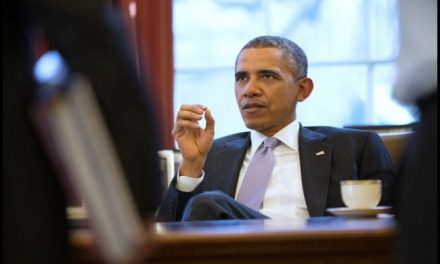By Ilhan Tanir, Ahval
Turkey and the United States are experiencing one of the most problematic periods in their history as allies, all centred on Turkey’s purchase of Russian-built S-400 missile defence systems.
This may not be the first difficulty the countries have faced, but with the United States ready to pull Turkey from the F-35 fighter jet programme, and Turkish officials showing no intention of backing down, observers have questioned whether Ankara can remain on the western axis.
U.S. officials are adamant that such a split is not on the cards, Pentagon Spokesman Eric Pahon told Ahval in an on-the-record interview on Thursday. For Pahon, the current troubles over the S-400 are just one facet in a 70-year relationship that he said “will continue to remain strong forever”.
Nevertheless, Turkey’s purchase of Russian military equipment has raised fears that cannot be glossed over. Pahon discusses these and the broader picture of U.S.-Turkish relations in the first part of Ahval’s exclusive interview.
After more than half a century, it appears that Turkey for the first time is not going to use the latest U.S.-made fighter jet. How significant is this?
The United States and Turkey’s relations are a lot bigger than this one issue. It is significant, don’t get me wrong.
But we are looking at our longstanding bilateral ties, the deep economic coordination we have, looking at the rest of the defence relationship, which includes İncirlik airbase – which is a key strategic base – our cooperation in Syria, it includes helping Turkey with its issues with the PKK (Kurdistan Workers’ Party), security concerns with the PKK, we’ve got a lot of concurrent issues going on.
(U.S. Acting Defense) Secretary Shanahan spoke to (Turkish Defence Minister Hulusi) Akar on Thursday, and he reiterated that if Turkey reverses its plan to purchase the S-400, we can also reverse its expulsion from the F-35 program.
But it is serious, we’d like to see them get the latest and greatest fighter jet, which is light years beyond anything else out there. We want our allies to have every competitive advantage, but also, we want to protect the jet and protect the programme.
We have many countries interested in buying the F-35 and already involved in the program. What we see is a huge security risk to the programme (with the deployment of the S-400), that has the ultimate possibility of destabilizing the entire programme and everybody’s investment. It is unfortunate. We are doing everything we can.
Acting Secretary Shanahan with Minister Akar, President Trump with President Erdoğan, are trying to offer them every possible alternative to help satisfy Turkey’s air defence system needs in the short term but also in the longer term. It is really unfortunate and regrettable that Turkey is going to be removed from the programme.

Could the Chinese J-31 Russian Su 57 jets be an alternative to your jets?
I don’t think it is going to be an alternative to the F-35s, which are the most advanced fighter jets in the world, hands down.
There is a multi-national collaboration to assemble this programme. Parts are made in different countries, which regularly meet to discuss the program, Turkey is not going to be invited for the first time (due to its S-400 purchase).
And you want to compare it to Russian or Chinese products – they are nowhere near the quality. If Russians or Chinese had done such a quality product, everybody would have invested in it. That is clearly not the case.
After the S-400 deployment, do you think intelligence sharing with Turkey will continue as before?
I don’t think those decisions have been made yet. We are going to cooperate in all the areas we have been cooperating in. I cannot emphasise strongly enough that the F-35 and S-400 issue is an F-35 and S-400 issue (and not a broader issue).
We are going to continue to provide support for their counter-terror efforts on their southern border and address their very legitimate security concerns. We are not going to discontinue working within Turkey with embassies, missions and bases like İncirlik. We have this huge and long-standing alliance over 70 years, we are allies and partners and that stuff will continue.
I think in the conversation between Acting Secretary Shanahan and Minister Akar, both have expressed how important these relations are. They talked about how they were both looking forward to seeing each other in Brussels in the summer. This is a very difficult situation, but we’ve come out of very difficult situations in the past just as strong. So, it is going to be rough for a while. But we see our relationship as staying solid forever.
You are saying the United States is trying to help Turkey with its security concerns, but Turkey’s Erdoğan says his government and himself personally have been targeted by your government. How has there been such a big difference in perspective?
Obviously, we are very sensitive about Turkey’s sensitivity to possible ties to terror organisations. That is why we work together in Manbij (in Northern Syria) with the Manbij roadmap.
Turkey expressed its concerns about some PKK-affiliated people in an official capacity in Manbij, and we agreed to move YPG (Peoples’ Protection Units) affiliates to the east of the Euphrates river. Turkey gets a vote in the leadership in Manbij and gets to vet leaders there. We both look at people in leadership positions as Turkey gets a voice on that.
In the joint patrols we are doing, we’re trying to be transparent and visible as much as we possibly can. It’s a process and we are working through the process. When we went to Syria with a very, very small force, we had to quickly assemble a force to defeat the ISIS. it was a larger threat to the world than some of those other elements in Syria. Now, ISIS is winding down, and we have these leftover things to deal with. This is not just a U.S.-Turkey issue, but an international issue with 79 Global Coalition members.
What is your expectation from the Trump-Erdogan meeting at the end of month?
All levels of the government are trying to work out (the S-400 issue). Secretary Pompeo is talking to (Turkish Foreign Minister Mevlüt) Çavuşoğlu. Secretary Shanahan is calling Minister Akar, our president is talking to President Erdogan. All levels are working.
There is one sticking point that we have been very clear about, that the S-400 and F-35 cannot be co-located. If they purchase S-400s then that totally inhibits us from getting Patriot systems there.
There are going to be, unfortunately, some unavoidable economic ramifications, such as CAATSA sanctions the will be imposed by the Congress. There is full bipartisan support for these sanctions. We been very clear about what is going to happen here, but at the same time, this defence relationship is incredibly important to the United States and to the alliance, to all the multilateral organisations that we belong to.
We work very hard to meet everybody’s needs, but we’re still not there yet. That is why we are pushing back some deadlines. Slowly phasing out Turkey from F-35 program. We first began taking steps two months ago, when we stopped deliveries of some parts.
That’s why we are not cutting everything out suddenly, because the United States really wants to work with Turkey. We are doing the best we can here. Sometimes diplomatic disagreements don’t have positive resolutions and you need to deal with the fall out of that. So, the United States at all levels is reassuring (Turkey) that, hey, maybe the F-35 portion will not work, but we really want to maintain all other parts of partnership in other areas.
But some say that if the S-400 is deployed, this is just the beginning of Russian build-up. It will just grow closer and closer to Turkey while the United States withdraws from Turkey more and more. Do you agree?
One would hope not. One would hope this would stop at the S-400. Turkey is a longstanding NATO member. NATO was founded to counter Russian aggression. If you looked at things that Russia has done on Turkey’s border in recently – they have an active and ongoing occupation in Georgia, just across the Turkish border.
Russia has shown not afraid to use their military or proxy forces to cause destabilisation and then try to provide a solution to the destabilisation that they caused. They cause the wound then they want to provide the band-aid. They have been very actively trying to cause rifts in the alliance, and they have been active in a bunch of other ways.
The S-400 is just another such issue. What a golden opportunity for Russia to try to divide the alliance, divide the U.S.-Turkey relationship. They want nothing more than to be able to do these things, right?
We have seen Russian disinformation in the Turkish press a lot as well. We have seen a lot of stories, a lot of them attributed to “Turkish officials”, but after we do some research and trace them back we see these quotes go back to (Russian state outlets) RT or TASS that made into the Turkish Press.
We are seeing this more and more, and we see the same thing with F-35 issue. We see that the Russian disinformation campaign has kicked up. They are trying to influence and persuade the Turkish public to be more Russia-leaning.
But Russia has proven themselves to be unreliable partners worldwide. Russia has proven themselves time and time again as a so-called “partner” that takes and takes more and seizes and seizes more. It is like what China does in certain situations. It is about their economic improvement and the projection of their military power, and it comes at a great cost to the nations that they are partnered with.
What kind of an impact would there be on the Turkish Army if they deploy and operate the S-400 systems?
Anytime you invite Russia to your country with their equipment and their sophisticated intelligence-gathering capabilities, and allow them to access your networks, you are inviting disaster. It’s a basic information security principle. When I get an email invite from a Nigerian prince, I don’t open it, right? You are not doing exactly the same thing, but it’s something like that.
You are inviting a sophisticated piece of technology that may not be fully vetted, and without knowing other sophisticated assets that may be coming along with it, into your system, into your computer system, your security system. And you are trusting the Russians that they will do the right thing with these capabilities.
This is the same warning we have been issuing about the Chinese integration into critical communication infrastructure. Huawei is one of the companies we have deep concerns about, that the Chinese government has open access to all the info this phone company is gathering.
That is what we have been primarily focused on, on the technology side. The same thing be said about the Russians. When you integrate those systems, you are taking a risk. If at the same time you are investing heavily in NATO and in the alliances that try to protect you from that same risk, it does not make a lot of sense.
What would be the Turkish position in NATO after the S-400 is deployed, and what if it buys Russian Su-57 jets or Chinese J-31 jets in place of the F-35?
All NATO allies agree that introducing the S-400 to the alliance is a bad idea. So, they are weakening their position.
They will continue to be in the NATO alliance, there is really not a mechanism to remove someone from the NATO alliance. We’ll see what will come out of the next NATO ministerial (on June 26-27).
There will be lots of frank and open discussions over these very same issues. We will watch how it works out. Again, you know Turkey is a valuable NATO ally, and is a great partner who is deeply integrated into our training exercises and in our operations. I don’t think that will change. All alliances and relationships have rough patches, but that doesn’t mean those issues will not be overcome. I do not think (the S-400 purchase will cause) anything permanent.
Could Turkey be excluded from some of those meetings at NATO like it is being excluded from F-35 meetings now?
That is a question for NATO, not for the United States. We will continue to consult with Turkey and carry on the relationship, and to continue our cooperation.
© Ahval English



















